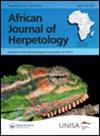Digging adaptations evolved independently in two lineages of Psammophiid snake: evidence from cranial morphology
IF 0.9
4区 生物学
Q3 ZOOLOGY
引用次数: 0
Abstract
ABSTRACT The Beaked Snakes (Rhamphiophis) are semi-fossorial snakes with reinforced snouts adapted for digging. The Skaapstekers (Psammophylax) are generalist terrestrial snakes. Both belong to the family, Psammophiidae. The Striped Beaked Snake (Kladirostratus acutus) was originally assigned to the genus Rhamphiophis, because of its beak-like snout. However, molecular evidence indicates that K. acutus is more closely related to Psammophylax. Thus, the “beak” of K. acutus must have evolved independently of that seen in Rhamphiophis. We studied the cranial morphology of K. acutus and representatives of Psammophylax and Rhamphiophis to identify possible traits that may reflect independent derivation of a beak-shaped snout relative to Rhamphiophis. We found that K. acutus retains four main cranial features in common with the Psammophylax: (1) an open fenestra between the premaxilla, nasals and septomaxilla, (2) a lack of fusion between the septomaxilla and the vertical lamina of the nasal, (3) the conchal processes of the septomaxilla extend beyond the dorsal margin of the septomaxilla and (4) a lack of contact between the prefrontals and the dorsal laminae of the nasals. Simultaneously, K. acutus displays traits associated with adaptation to semi-fossorial life in snakes such as a shortening of the maxilla, modification of the premaxilla, elongation of the nasal region, and a narrowing of the braincase.Psammophid蛇两个谱系的挖掘适应能力独立进化:来自头骨形态学的证据
喙蛇(Rhamphiophis)是一种半化石蛇,其强化的鼻子适合于挖掘。Skaapstekers (psammoophylax)是一种多面手的陆生蛇。它们都属于沙蛉科。条纹喙蛇(Kladirostratus acutus)最初被归入rhamphiphhis属,因为它有喙状的鼻子。然而,分子生物学证据表明,尖叶杉与沙杉的亲缘关系更为密切。因此,阿库图斯的“喙”一定是独立于rhamphiphos的喙进化而来的。我们研究了尖头库鼠以及沙棘科和rhamphiphos的代表物种的颅骨形态,以确定可能反映相对于rhamphiphos独立衍生的喙状口部的特征。我们发现,尖牙K.保留了与沙棘相同的四个主要颅骨特征:(1)在上颌骨前、鼻翼和鼻中隔腋窝之间有一个开放的窗;(2)鼻中隔腋窝和鼻垂直板之间缺乏融合;(3)鼻中隔腋窝的鼻甲突延伸到鼻中隔腋窝的背缘之外;(4)前额叶和鼻背板之间缺乏接触。与此同时,尖吻蛇显示出与适应蛇类半穴居生活相关的特征,如缩短上颌骨、修改前上颌骨、延长鼻区和缩小脑壳。
本文章由计算机程序翻译,如有差异,请以英文原文为准。
求助全文
约1分钟内获得全文
求助全文
来源期刊

African Journal of Herpetology
ZOOLOGY-
CiteScore
3.00
自引率
6.70%
发文量
15
审稿时长
>12 weeks
期刊介绍:
African Journal of Herpetology (AJH) serves as an outlet for original research on the biology of African amphibians and reptiles. AJH is an interdisciplinary journal that publishes original articles and reviews from diverse fields and disciplines, such as conservation, phylogenetics, evolution, systematics, performance, physiology, ecology, behavioural ecology, ethology, and morphology.
The Journal publishes two issues a year. There are no page charges .
 求助内容:
求助内容: 应助结果提醒方式:
应助结果提醒方式:


